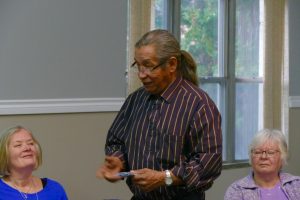Commitment, Communication and Compassion
(Proverbs 31:10-31; Ps 145:8-18; 1 Jn 3:18-24; Jn 17:20-23)
********************************************************
The summer for me has been a joyful focus on marriage: celebrating the 40thanniversary of Stan and Pauline Hood in Beauval at whose wedding I presided; celebrating the 50thanniversary of the Worldwide Marriage Encounter movement in Lombard, Illinois with 650 couples, 90 priests and 4 other bishops; presenting at a Marriage Encounter weekend in Vancouver last week, and now presiding at the wedding of Dion and Crystal, Stan and Pauline’s daughter.

Preparing for closing celebration, Vancouver
The readings chosen for this occasion remind me of the three C’s of a good marriage – commitment, communication, and compassion.
Regarding commitment, your commitment today elevates your relationship to a sacrament, a sign of who God is, totally committed to us. Israel was always supposed to be an icon of God on earth, drawing the other nations back to God by their commitment to the Mosaic covenant relationship – a commitment they never kept. So, the Father sent Jesus as a new covenant to reveal to us the depth of the Father’s love, and now Jesus relies on marriage, on your sacrament, to be a visible sign of God’s love for us all. Your commitment today touches our hearts because it speaks to us of God’s eternal love for us.
At the recent Marriage Encounter weekend, the word communication emerged as central to a good marriage. Jesus is the greatest communicator of all – in John 14 he no longer calls us servants but friends, because he has made known to us all he learned from the Father. When Jesus died on the Cross, the curtain in the Temple that separated people from the Holy of Holies was ripped from top to bottom. With the death of Jesus, there is no more separation from God who is now fully revealed to us. We can now see right into the heart of God, and what we see is mercy, compassion, humility, unconditional love, forgiveness and total non-violence – a description very similar to the words of Psalm 145 read today.
In the gospel, Jesus calls his disciples to a unity and oneness so perfect the world will recognize it was the Father who sent him. That unity involves achieving intimacy, which is what every human heart yearns to experience. Intimacy involves complete trust and acceptance. Within the Marriage Encounter movement, intimacy is achieved by the humble honest sharing of feelings.

Couple dialoguing
My friend Wesley used to stay in my small rectory in Beauval when he was up north working as a surveyor. Every night he would call his wife Donna in Saskatoon just to share his day with her, and she her day with him. After a week of calls, I commented those long-distance calls must be expensive. He replied simply, “It’s not an expense – it’s an investment.” Now there is a wise man – investing time and money into his relationship through daily communication, a practice ME promotes. I would encourage you to do the same – take down any spiritual walls that go up when separated by communicating your feelings and experiences on a daily basis.

Wes & Donna with family at their summer cottage
Finally, both the psalm and second reading bring together compassion and love. Our commitment to communication will involve compassionate love. Jesus gave us the commandment to love in different ways. First was the Grand Shema of Judaism – to love God with our whole being. Then Jesus took an insignificant law from Leviticus – love one another as we love ourselves – and put it on an equal footing with the Grand Shema. From now on, we love God best by loving one another as we love ourselves. That is the newness of Jesus’ teaching.
There is a strong reminder here to love ourselves, a struggle for many of us. We can love ourselves by being in touch with our emotions and not suppressing them, which is emotional abuse. We can love ourselves by accepting ourselves as we are, forgiving ourselves our past mistakes and accepting compliments. This is probably the commandment we break the most.
Jesus then raises the bar – we are to love one another as he has loved us. That is sacrificial love – giving our lives away and being generative, to make the world a better place. Winston Churchill once said, “We make a living by what we get; we make a life by what we give away.”
Finally, we are to love our enemies and do good to those who persecute us. We do that best by forgiving them. In Matthew 18:15, Jesus even teaches us how to forgive. We are to go to those who hurt us and not fight, flee or freeze (the psychological options) but to forgive – a faith option. The way we forgive is simply reflect back the hurtful behavior, share our feelings with the person, and let them know we are trying to forgive them. Then we are just like Jesus on the cross – “Father, forgive them, they know not what they do.” And when we act like God, we get to feel like God – peace, joy, and self-esteem.
Sometimes, our commitment, communication and compassion will mean we need to apologize to those we have hurt. That process involves reminding others of our hurtful behavior, soaking up their pain, asking for forgiveness, making a declaration to change, and then trying to make amends. This is Step 8 and 9 of the 12 Step Program.
Elder A.J. and his wife are a great example of this. Unable to stand himself anymore as an alcoholic and abusive person, he told his wife one day to sit down because he was going to tell her who the man she married really was, and told her about his past, holding nothing back. Her reaction was to get physically sick, throw up and not talk to him for a week, so he would go for long walks. After a week, she told him to sit down because she was going to tell him who the woman he married really was, and proceeded to tell him her story, holding nothing back. Now it was his turn to get angry and not talk to her for a week. Then they found themselves building a sweat lodge together, had a sweat and haven’t talked about that ever since. In their own cultural way, they were reconciled.

Elder A.J. sharing his story
The Eucharist as part of your celebration is so fitting, because it is a banquet communicating God’s commitment and love for us, through Word and sacrament.
May our celebration of both this Eucharist and your marital commitment strengthen our faith in Jesus, and empower us all to live out our faith commitment more fully, communicate with one another more deeply, and express our faith through love for others with greater compassion. May God bless us all.




Well thanks for lovely speech about the marriage encounter and wedding homily today. These are the teachings that God wants us to learn and follow his example in teaching other people. We are to forgive people for their faults and wrong doings and tell them how they hurt us and forgive them. We are to express our emotions and feelings out in the open then have it hidden inside us. If you don’t follow this step you will not be heal yourself and those feelings will control you. Your relationships will have no improvements with other people and with God. We have to forgive ourselves by going through reconciliation and confession and repent. To strengthen the relationship we must have a positive and open mind and behaviour to communicate with other people. Next, is having love all the time that comes from our hearts. We have to use this love to one another and love God. We have to love ourselves and love enemies by making amends and doing good things. Amen Amen
Thanks Bishop Lavoie for the lovely homily and messages and pictures. Many Blessings !
We have to use this love to love one another and love our enemies. I Love You Jesus.